Tucked away in the historic Higashiyama district of Kyoto, the ancient Jojuuji Temple offers visitors a unique opportunity to enjoy the timeless traditions of Zen Buddhism. Under the guidance of Abbot Mr. Shizan Fujioka, participants embark on a captivating 2.5-hour journey that blends the centuries-old practice of zazen meditation with the serene art of the Japanese tea ceremony. As they savor seasonal delicacies and soak in the temple’s rich spiritual heritage, attendees gain a deeper understanding of the Zen philosophy and its impact on mindful living. But the true essence of this experience lies in its ability to transport visitors to a realm where time seems to stand still, inviting them to uncover the hidden depths of this enchanting sanctuary.
Key Points
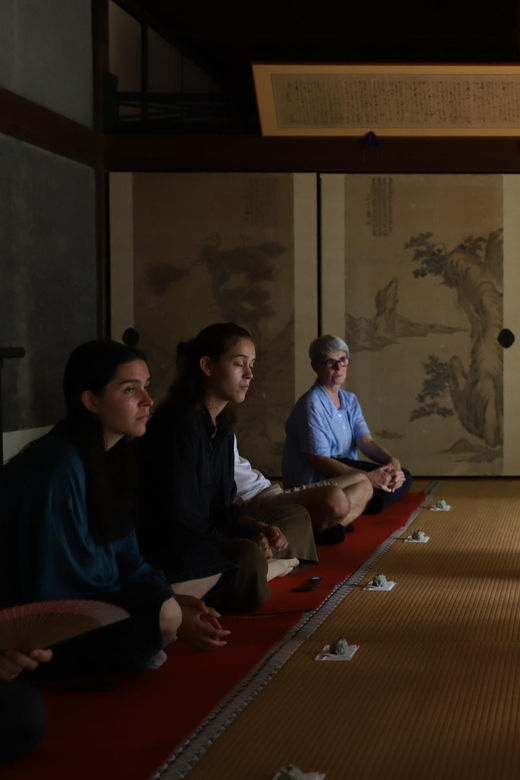
-
Visitors can enjoy the centuries-old traditions of Zen Buddhism at the 1,200-year-old Jojuuji Temple in Kyoto’s historic Higashiyama district.
-
Under the guidance of Abbot Mr. Shizan Fujioka, guests learn the art of zazen or Zen meditation and participate in an authentic Japanese tea ceremony.
-
The Jojuuji Temple, originally a samurai residence and later converted to Zen Buddhism, offers a captivating glimpse into Japan’s rich cultural heritage.
-
Participants can savor seasonal Japanese delicacies, such as wagashi and daifuku, alongside the freshly brewed sencha tea in the temple’s serene garden.
-
Advance booking is recommended due to the limited group size and the temple’s secluded location, accessible through winding streets and narrow alleys.
Taking in Zen Buddhism
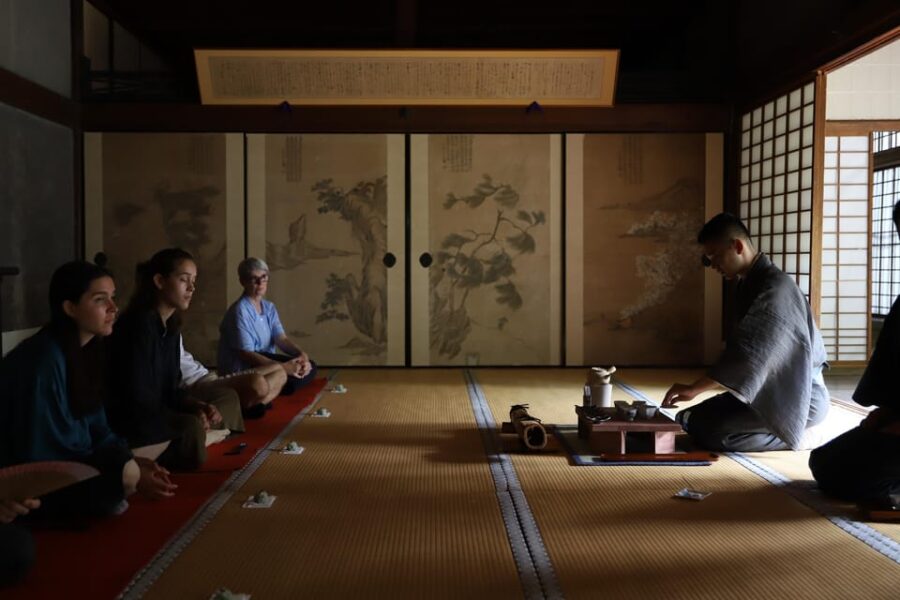
As visitors step inside the ancient Jojuuji Temple, they’re invited to enjoy the timeless traditions of Zen Buddhism. Under the guidance of the abbot, Mr. Shizan Fujioka, guests learn the art of zazen, or Zen meditation. Through focused breathing and mindful awareness, they discover the path to inner peace and clarity.
The experience continues with a serene tea ceremony, where a tea master leads participants through the intricate steps of preparing and serving sencha tea. Sipping the fragrant beverage amidst the temple’s tranquil garden, guests gain a deeper appreciation for the harmonious intersection of spiritual and cultural practices that define the Zen way of life.
You can also read our reviews of more tours and experiences in Kyoto.
Jojuuji Temple’s Captivating History
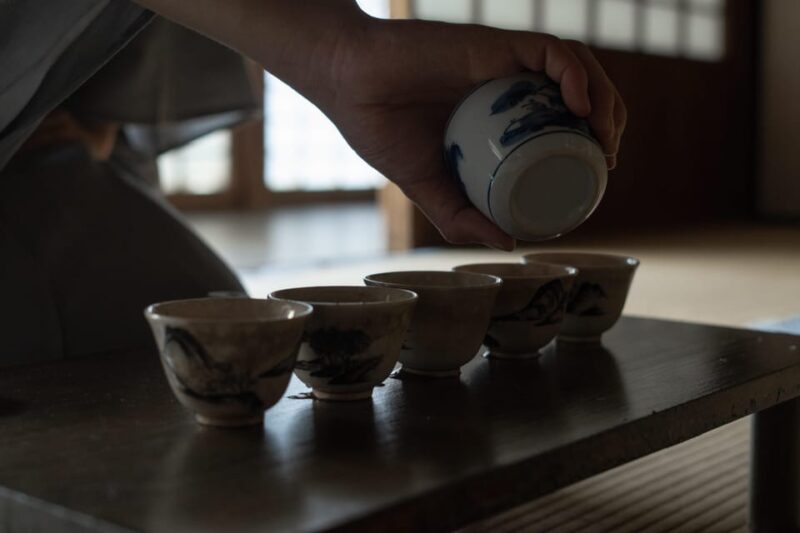
How did the Jojuuji Temple, with its 1,200-year-old history, transform from a samurai residence into a revered center of Zen Buddhism? Originally established as a private home for samurai in the early 9th century, the temple was later converted to the Ōbaku sect of Zen Buddhism in the 17th century.
Today, Jojuuji maintains its historical atmosphere as a Tangible Cultural Property. Visitors can experience the temple’s rich legacy, from its origins as a samurai dwelling to its current role as a hub for Zen practice and Japanese cultural traditions.
The temple’s abbot, Mr. Shizan Fujioka, is dedicated to sharing Jojuuji’s captivating history and promoting its enduring cultural significance.
Abbot’s Commitment to Preservation
The abbot of Jojuuji Temple, Mr. Shizan Fujioka, is deeply committed to preserving the cultural heritage of this 1,200-year-old institution. Trained at the renowned Manpukuji Temple, he’s dedicated to promoting the temple’s historical and spiritual significance.
As the head priest, Fujioka oversees the Zen meditation sessions and tea ceremonies, ensuring visitors experience the authentic traditions of the Ōbaku sect. He personally leads the Q&A sessions, sharing insights into the temple’s rich history and the monks’ way of life.
Fujioka’s passion for preserving Jojuuji’s legacy is evident in the meticulous care he takes in maintaining the temple’s historical atmosphere and introducing guests to its captivating culture.
Zazen Meditation Experience
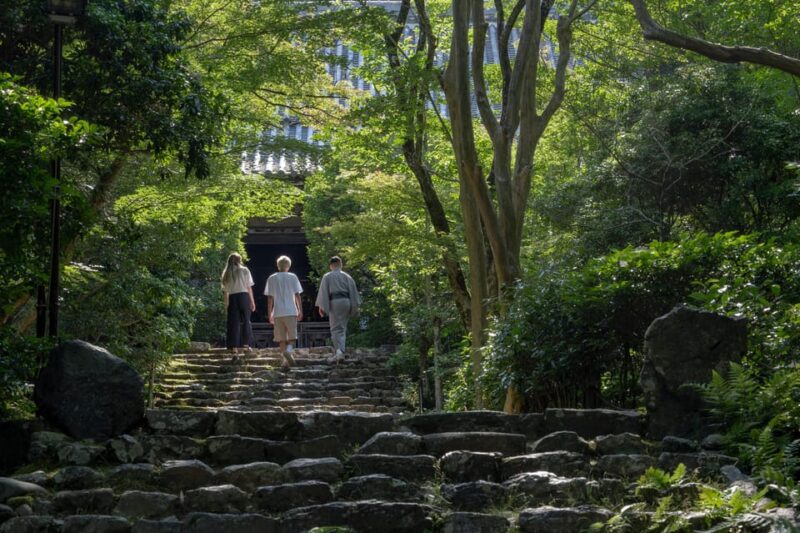
Visitors who partake in the Zen meditation experience at Jojuuji Temple can expect to be immersed in the centuries-old practice of zazen. Under the guidance of the head priest, you will:
- Learn the proper posture and breathing techniques for Zen meditation
- Engage in a 30-minute sitting session, cultivating mindfulness and tranquility
- Have the opportunity to ask questions about the practice and its origins
- Gain a deeper understanding of the role of meditation in Zen Buddhism
- Emerge from the session feeling refreshed, focused, and connected to the temple’s rich history.
Sencha-do Tea Ceremony
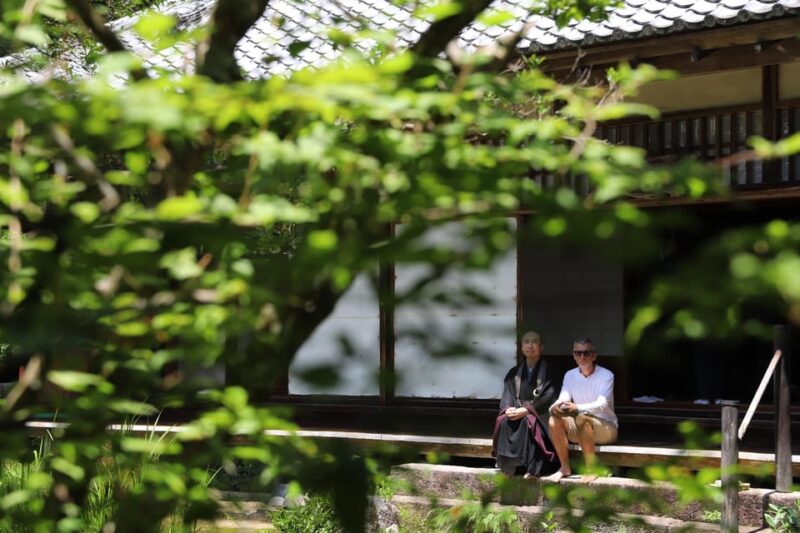
Following the completion of the Zen meditation session, participants then move on to the second part of the experience – the sencha-do tea ceremony.
Led by a skilled tea master, this traditional ritual showcases the precise and elegant preparation of sencha, or steamed green tea. Guests will learn about the history and etiquette of the tea ceremony as they observe the careful movements and attention to detail.
Afterwards, they’ll have the opportunity to enjoy the freshly brewed sencha alongside seasonal Japanese sweets in the peaceful temple garden. The sencha-do experience provides a serene and authentic glimpse into Japan’s cultural heritage.
Seasonal Japanese Delicacies
Participants savor seasonal Japanese sweets as they sip the freshly brewed sencha in the temple’s peaceful garden. The matcha tea is accompanied by a selection of traditional confections, each one a delightful bite-sized work of art.
These delicacies may include:
- Wagashi – intricate sweets made from mochi, bean paste, and seasonal ingredients
- Daifuku – soft mochi filled with sweet red bean paste
- Yokan – dense jellied blocks flavored with azuki beans or fruit
- Dorayaki – fluffy pancake-like pastries sandwiching sweetened red bean paste
- Okashi – traditional snacks such as rice crackers or layered sponge cakes
The flavors and textures of these treats complement the earthy notes of the sencha, creating a harmonious sensory experience.
Practical Considerations
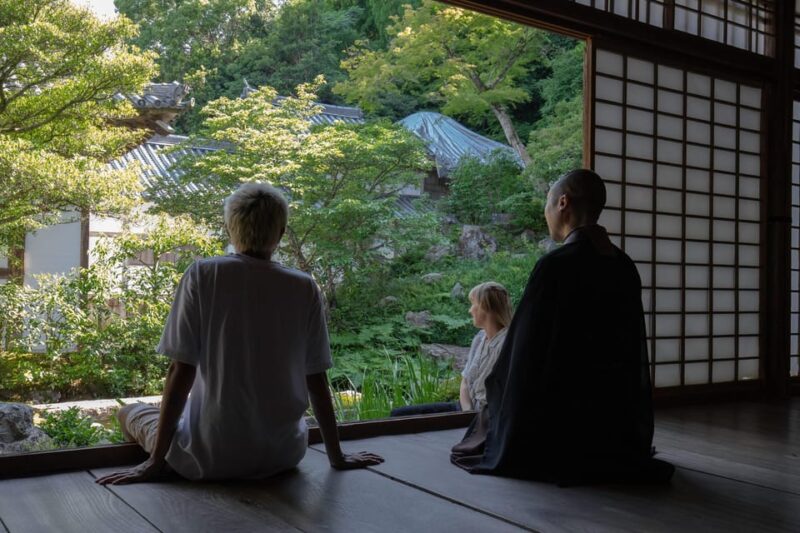
Reserving a spot for the Zen meditation and tea ceremony experience at Jojuuji Temple is recommended, as the small group size is limited to 10 participants. The price for the 2.5-hour program is SEK 424 per person. Cancellations are eligible for a full refund up to 24 hours in advance.
The temple isn’t wheelchair-accessible due to stairs, so visitors should be prepared for this. Plus, guests are advised to wear appropriate clothing for the season. Those interested in this unique cultural experience should book in advance to secure their spot.
Accessing the Hidden Temple
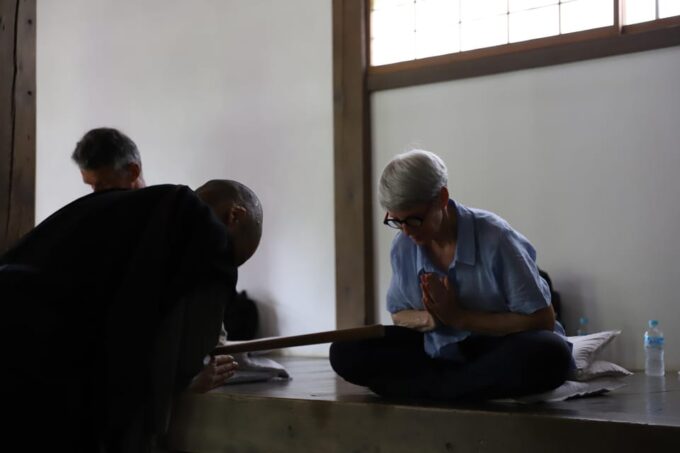
Jojuuji Temple’s secluded location adds to the allure of this centuries-old sanctuary. To access this hidden gem:
- Follow the winding streets and narrow alleyways of Kyoto’s historic Higashiyama district.
- Look for the temple’s discreet entrance, marked by an unassuming wooden gate.
- Ascend the stone steps, leaving the bustling city behind as you enter the temple grounds.
Explore the serene gardens and meticulously preserved structures, a testament to Jojuuji’s rich history. Prepare to learn about the temple’s contemplative atmosphere, ready to experience the blend of Zen meditation and traditional Japanese tea ceremony.
Frequently Asked Questions
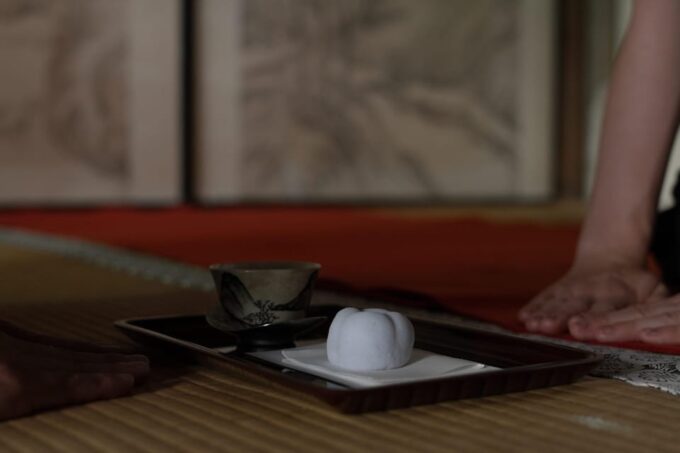
Can I Take Photos During the Meditation and Tea Ceremony?
During the experience, photography is generally not allowed out of respect for the sacred rituals. Participants should avoid disturbing the peaceful atmosphere and focus on being fully present in the moment.
Is There a Dress Code for This Experience?
There’s no strict dress code, but appropriate clothing for the season is recommended. Comfortable, modest attire that allows for easy movement during the meditation and tea ceremony is best.
How Much Physical Activity Is Involved During the Program?
The program involves moderate physical activity, including sitting for meditation and walking around the temple grounds. Guests should be able to comfortably sit on the floor for up to an hour during the meditation session.
Is There an Option for Vegetarian or Gluten-Free Refreshments?
The temple offers vegetarian and gluten-free options for the matcha tea and seasonal sweets served during the tea ceremony. Guests can request these dietary accommodations when booking the experience.
Are There Any Age Restrictions or Requirements for This Experience?
The Zen meditation and tea ceremony experience at Jojuuji Temple does not have any age restrictions. However, participants must be able to participate in the activities, which may require some physical mobility. Reservations are available for all ages.
Recap
Jojuuji Temple offers a captivating Zen experience in Kyoto’s historic Higashiyama district. Under the Abbot’s guidance, visitors enjoy timeless traditions – from zazen meditation to a serene tea ceremony. They savor seasonal delicacies while exploring the temple’s rich heritage, leaving with a deeper understanding of Zen and mindful living. This hidden gem provides a truly immersive cultural and spiritual journey.
You can check if your dates are available here:More Tour Reviews in Kyoto
- The Art of Geisha: Exclusive Show & Traditional Japanese Game
- Tea Ceremony With Kimono and Professional Photoshoot in Kyoto
- Kyoto Arashiyama Bamboo Forest Hidden Hiking Tour
- Kyoto Early Morning Walking Tour: Nature & History
- Small-Group Dinner Experience in Kyoto With Maiko and Geisha
- Private Kyoto Night Tour: Historic Walk at Gion and Fushimi
Not for you? Here's more things to do in Kyoto we have recnetly reviewed
- 5 Best Cruises And Boat Tours In Kyoto
- 14 Best Dining Experiences In Kyoto
- 20 Best Full-Day Tours In Kyoto
- 5 Best 2 Day Tours In Kyoto
- 2 Best 4 Day Tours In Kyoto
- 20 Best Photography Experiences In Kyoto
- 13 Best Dinner Tours In Kyoto
- 25 Best Food Tours In Kyoto
- 14 Best Lunch Experiences In Kyoto
- Kyoto Bus Tour: Iconic KInkakuji, Ginkakuji, Kiyomizu Temple (AW)
- Kyoto Bus Tour: Arashiyama, Kinkaku-ji Review
- Gyoza Cooking Class in Kyoto: Traditional Japanese Dumplings
